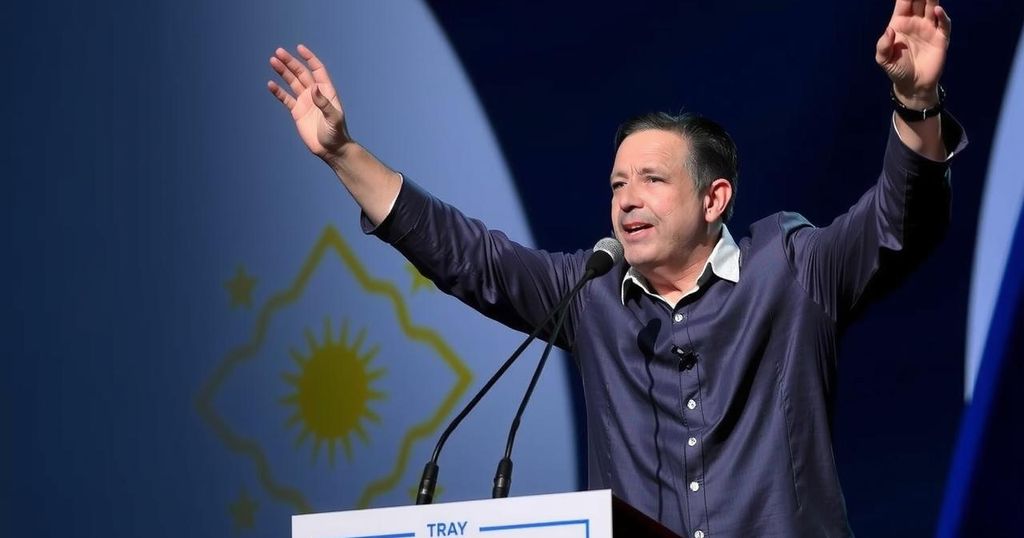Uruguay’s governing coalition has conceded the presidential run-off to left-wing candidate Yamandu Orsi. Alvaro Delgado, the conservative candidate, acknowledged his defeat with more than 57% of votes counted. This election marks a return of the Broad Front party to power after a brief conservative rule, with high voter turnout indicating strong civic engagement. Orsi’s moderate platform aims for gradual reforms rather than radical changes, setting an optimistic tone among voters.
In a significant political shift, Uruguay’s governing coalition has conceded victory in the presidential run-off election to left-wing candidate Yamandu Orsi. Alvaro Delgado, the candidate from the conservative National Party, acknowledged the defeat during a gathering at his campaign headquarters, expressing his congratulations to Mr. Orsi despite the ongoing vote count, which had more than 57% of official votes recorded. Mr. Orsi will take over leadership from the current president, Luis Lacalle Pou, who shattered a 15-year rule by the Broad Front party when he was elected in 2020.
This election indicates a critical moment for Uruguay, as Mr. Orsi of the centre-left Broad Front, known for progressive reforms such as the legalization of abortion and same-sex marriage, now steps into the presidency. President Lacalle Pou communicated his readiness to assist in the transition as he formally congratulated Mr. Orsi, emphasizing a commitment to ensure a smooth changeover of power. Voter turnout for this election stood at an impressive 89.4%, reflecting the high level of civic engagement in Uruguayan democracy.
Independent exit polls indicated Mr. Orsi leading with approximately 49% of the vote versus Mr. Delgado’s 46%. Analysts note that Mr. Orsi’s election aligns with a global trend, where voters are increasingly dissatisfied with existing governments, largely due to post-pandemic economic challenges. Nonetheless, Mr. Orsi’s platform suggests a moderate approach, working towards addressing key issues without pursuing radical changes, which distinguishes him from more extreme political movements witnessed globally.
In discussing his administration’s goals, Mr. Orsi envisions tax reforms to attract investments and social security modifications aimed at reducing the retirement age while respecting fiscal constraints. His agenda appears to maintain a balance between promoting market-oriented policies and welfare, characteristics that previously defined the Broad Front’s governance. Many citizens, like nurse Yeny Varone, express optimism regarding Mr. Orsi’s commitment to improving conditions for future generations.
This election marks a pivotal point for Uruguay, as it returns to a leftist leadership keen on gradual reforms while managing its complex socio-economic landscape.
The recent presidential run-off in Uruguay represents a notable transition in the country’s political landscape, ending a five-year rule by a conservative coalition led by the National Party. This election result comes after an extended period of governance by the Broad Front party, which is recognized for significant social reforms during its tenure. Yamandu Orsi’s victory reflects a broader trend of voters rejecting incumbent administrations amid global dissatisfaction with economic conditions following the pandemic. As a moderate leader, Mr. Orsi’s policies aim for incremental change rather than the radical transformations often associated with leftist movements.
In conclusion, Uruguay’s political scene has entered a new chapter with the election of Yamandu Orsi, who promises to lead with a balanced approach, focusing on social welfare and economic growth. The concession by the conservative National Party signals an important response to public sentiment regarding governance and economic recovery. As Mr. Orsi initiates his presidency, it will be crucial to observe how he addresses the key issues facing Uruguay, such as poverty and organized crime, while implementing his proposed reforms.
Original Source: www.shropshirestar.com






